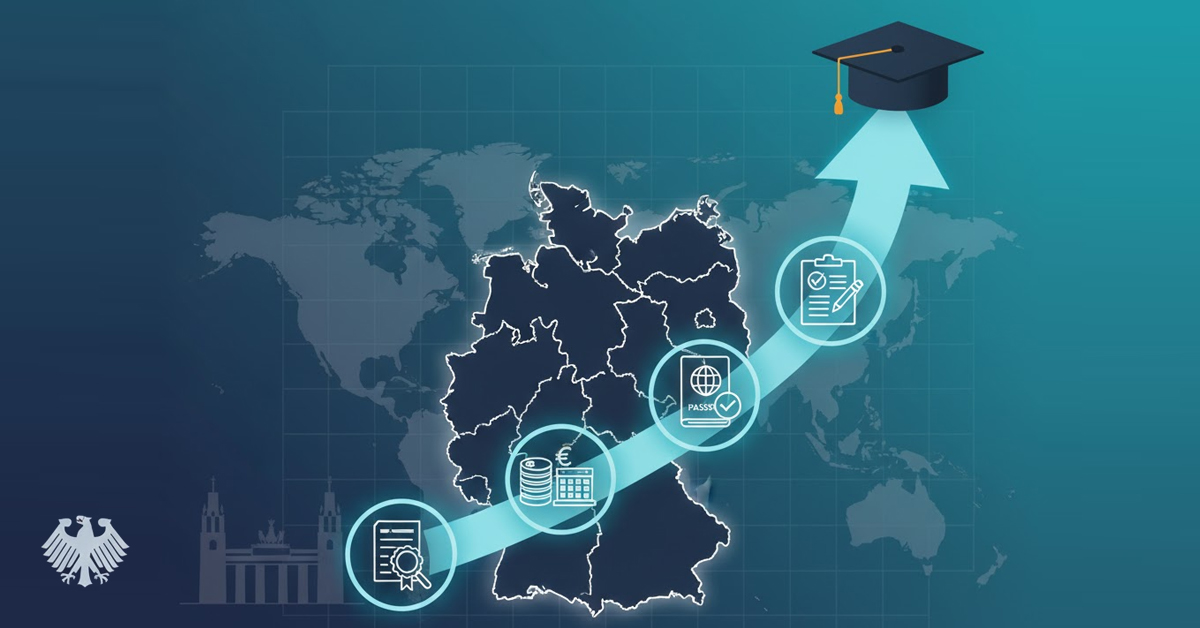Germany has become one of the most popular study destinations for Indian students. With top-notch universities, globally recognised degrees, and affordable tuition, it’s an ideal mix of quality and value. Whether you’re aiming for a degree in engineering, management, medicine, or any other field, Germany offers incredible academic and career prospects.
If you’re planning to study there, you’ll need a Germany Study Visa, your official permission to live and study in the country. Read further to understand the visa requirements, application steps, fees, and all the latest updates for 2025.
What is a Germany Study Visa?
A German study visa is an entry permit that allows international students to live and study in Germany. Indian students planning to stay longer than 90 days must apply for this visa before travelling.
The main type is the National D Visa, valid for over three months. Once you reach Germany, you can convert it into a residence permit for the entire study duration. Students attending short courses (under 90 days) can apply for a Schengen Visa, but most full-time students may need the D Visa.
Germany Study Visa Requirements for Indian Students
The Germany study visa requirements are strict, and all documents must be authentic. The German Embassy checks financial stability, academic background, and study intentions carefully.
Key Requirements
The following are the key requirements for a German study visa:
- Valid Indian passport (issued within the last 10 years).
- Admission proof from a recognised German university.
- Academic transcripts and certificates.
- Proof of language proficiency (German or English).
- Financial proof (blocked account or scholarship).
- Valid health and travel insurance.
- Motivation letter explaining your goals.
- Visa application and declaration forms (signed).
- Biometric photographs (as per specifications).
- Visa fee payment receipt in INR.
Academic Documents Required
The following are the documents required for a German study visa:
- Letter of Admission: From a recognised German university mentioning the course, duration, and language of instruction.
- Statement of Purpose (SOP): Explaining your reason to study in Germany.
- Academic Certificates: School, college, and degree transcripts (originals and copies).
- CV: Updated with education and achievements.
- Language Certificates:
- English: IELTS, TOEFL, or Cambridge English.
- German: Goethe-Institut, ÖSD, or TestDaF (minimum B2 level).
- English: IELTS, TOEFL, or Cambridge English.
- APS Certificate: Mandatory for Indian students applying to degree programs (issued by the Academic Evaluation Centre).
Financial and Health Documents
To prove you can support yourself, you’ll need:
- Blocked Account Proof: €11,904 (approx. ₹10.8 lakh) for one year, allowing monthly withdrawals of up to €992.
- Financial Guarantee: Scholarship award letter or a sponsor’s formal obligation letter (“Verpflichtungserklärung”).
- Tuition Fee Payment Proof: For universities that charge fees.
- Health and Travel Insurance: Covering illness, emergencies, and hospitalisation from your travel date.
- Accommodation Proof: University housing confirmation or rental contract.
Also Read: Switzerland Study Visa for Indian Students 2025
Step-by-Step Germany Study Visa Process
The German study visa process takes time, so start at least 10 to 12 weeks before departure. To apply for a study visa in Germany, follow the steps below:
Step 1: Get Admission
Obtain an admission letter from a recognised German institution.
Step 2: Gather Documents
Prepare two identical sets of documents that are signed, clear, and organised.
Step 3: Open a Blocked Account
Deposit €11,904 in an approved blocked account and keep the confirmation letter.
Step 4: Book an appointment
Schedule your slot at the German Embassy or VFS Global via the official German Mission India website.
Step 5: Fill Application Form
Complete and sign the online form and declaration as per Section 54 of the Residence Act.
Step 6: Pay Visa Fee
The current fee is €75 (₹7,000 approx.) for adults and €37.5 (₹3,500) for minors. Pay in INR via cash or demand draft.
Step 7: Attend Visa Interview
Submit your application, documents, and biometrics. Be ready for questions about your course and financial plans.
Step 8: Wait for Decision
Processing usually takes 6–12 weeks. You’ll receive updates through email or SMS.
Step 9: Collect Visa
Once approved, collect your passport and verify all details.
Where to Apply:
- Embassy of Germany, New Delhi
- Consulates in Mumbai, Bangalore, Chennai, Kolkata
- VFS Global Centres across India
Germany Study Visa Fees
| Applicant Type | Fee (€) | Approx. INR | Payment Mode |
| Adult (above 18) | 75 | ₹7,000 | Cash/Demand Draft (INR only) |
| Minor (below 18) | 37.50 | ₹3,500 | Cash/Demand Draft (INR only) |
Other Costs:
- APS Certificate: ₹18,000 (one-time).
- Translation & notarisation: ₹2,000 to ₹5,000.
- Blocked Account setup: ₹4,000 to ₹6,000 service fee.
Check the latest exchange rates before applying, as fees can vary slightly.
Germany Study Visa Processing Time
Visa applications usually take 6 to 12 weeks. During peak seasons (June to October), it might take longer due to high demand.
Tips:
- Apply three months in advance.
- Track your application via VFS or the Embassy website.
- Avoid booking travel until approval.
Incomplete or unclear documents can delay approval, so double-check everything.
Important Germany Study Visa Updates 2025
Here are the latest changes for Indian applicants:
- Online Application: Apply via the Consular Services Portal (CSP).
- No Remonstration: Appeals for rejected applications are replaced by direct reapplication.
- Updated Blocked Account: Minimum increased to €11,904.
- Revised Biometric Rules: Photos must be recent (within 6 months).
- Insurance Standards: Must match German public health criteria.
These updates simplify the visa process and make it more transparent.
After Receiving Your Germany Study Visa: Next Steps
After landing in Germany, complete these formalities:
- Register at Bürgeramt (Citizen’s Office): Within 14 days of arrival.
- Apply for a Residence Permit: At the local Foreigners’ Office (Ausländerbehörde).
- Activate Health Insurance: Switch to public insurance once enrolled.
- Open a Local Bank Account: For living expenses and part-time work.
- Understand Work Rights: You can work 120 full days or 240 half days per year.
Also Read: How to Pick the Right Study Abroad Counselling Consultant
Tips for a Successful Germany Study Visa Application
- Start your process early and organise all paperwork.
- Use clear copies and correct translations.
- Write a genuine motivation letter about your career goals.
- Ensure your blocked account and financial proof match requirements.
- Prepare confidently for the visa interview.
- Apply only through official channels (German Embassy or VFS).




